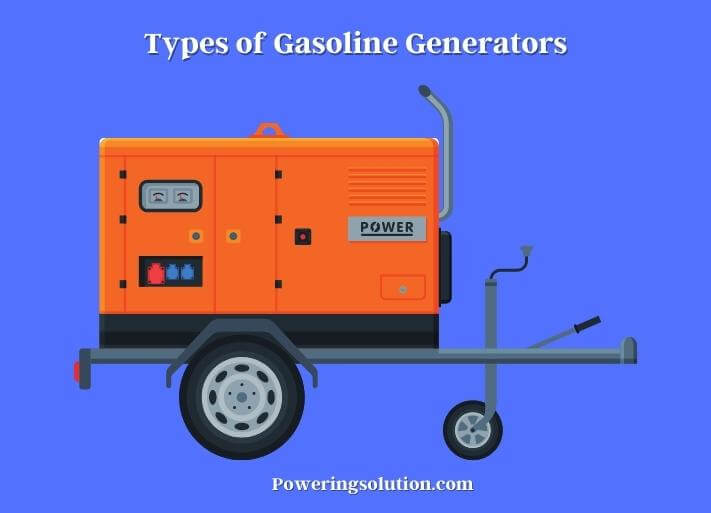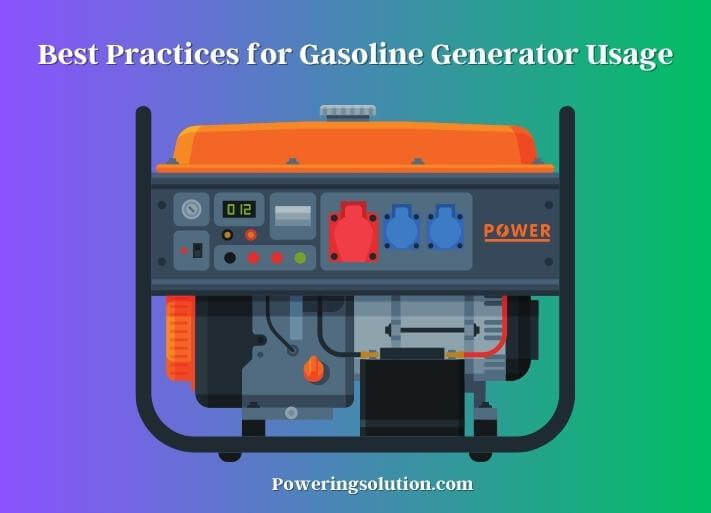Power outages can happen at any time and for various reasons, such as severe weather conditions, equipment failure, or even human error. When the power goes out, it can disrupt your daily routine and leave you in the dark, without heat or air conditioning, and without the ability to use essential appliances. This is where a gasoline generator can come in handy as your ultimate backup plan. A gasoline generator provides an immediate and reliable source of backup power, allowing you to power essential appliances, such as refrigerators, lights, and heaters, and keep your life running as normally as possible during an outage.

A gasoline generator is a portable power generator that runs on gasoline and converts mechanical energy into electrical energy. Gasoline generators come in various sizes and capacities and can be used for various applications, from outdoor events and construction sites to emergency power backup. In this article, we will explore the benefits of gasoline generators as a backup plan, how to choose the right generator, and how to use it safely and efficiently.
Types of Gasoline Generators
Gasoline generators come in various types and sizes, each with different features and capabilities. Here are some common types of gasoline generators:
Portable Generators
Portable generators are small and lightweight, making them easy to move from one place to another. They are ideal for powering essential appliances, such as refrigerators, lights, and heaters, during a power outage. Standby generators offer a reliable backup power solution that can help prevent the negative effects of power outages. Portable generators typically have a wattage capacity ranging from 1,000 to 10,000 watts.
Inverter Generators
Inverter generators are a type of portable generator that provides clean and stable power, making them ideal for sensitive electronics, such as laptops and smartphones. Inverter generators also operate quietly and are fuel-efficient.
Standby Generators
Standby generators are designed to provide backup power to an entire home or business during a power outage. They are permanently installed outside the building and are connected directly to the electrical system. Standby generators typically have a wattage capacity ranging from 5,000 to 50,000 watts.
Commercial Generators
Commercial generators are large and powerful, designed for use in construction sites, events, and other commercial applications. They typically have a wattage capacity ranging from 10,000 to 50,000 watts.

When choosing a gasoline generator, consider the intended use, the wattage capacity, and the fuel efficiency. It is important to choose a generator that meets your power needs and is efficient and reliable.
Advantages of Gasoline Generators
Gasoline generators offer several advantages as a backup power source, including:
Portability
Gasoline generators are portable and can be easily moved from one place to another, making them ideal for outdoor events, camping trips, and construction sites.
Quick and Easy to Use
Gasoline generators are easy to use and can be started quickly with the flip of a switch or the pull of a cord. This makes them an excellent backup power source during power outages when time is of the essence.
Cost-effective
Gasoline generators are relatively inexpensive compared to other types of generators, making them a cost-effective solution for backup power needs.
Availability of Fuel
Gasoline is readily available at most gas stations, making it easy to refuel your generator during a power outage or outdoor event.
Versatility
Gasoline generators can be used for various applications, from powering essential appliances during power outages to providing power for outdoor events and construction sites.
High Wattage Capacity
Gasoline generators can provide high wattage capacity, making them capable of powering essential appliances and even an entire home during a power outage.
Easy Maintenance
Gasoline generators are relatively easy to maintain and require regular oil changes and air filter replacements to ensure they function properly.
Using and Maintaining Gasoline Generators
Using and maintaining gasoline generators properly is essential for their safe and efficient operation.
Before using your generator, read the manual thoroughly to understand its features and how to operate it safely.
Place the generator on a flat, level surface away from combustible materials, such as leaves, grass, and wood chips. Never operate a generator indoors or in an enclosed space.
Always use fresh gasoline and oil and follow the manufacturer’s recommendations for the correct type and amount.
Turn on the fuel valve, set the choke, and start the generator according to the manufacturer’s instructions. Never start the generator with appliances plugged in.
After the generator is running smoothly, plug in the appliances you want to power. Be sure to connect the appliances to the generator using the correct voltage and frequency.
Regular maintenance is crucial for the safe and efficient operation of your generator. Follow the manufacturer’s recommendations for oil changes, air filter replacements, and other maintenance tasks.
When you’re done using your generator, turn off the fuel valve and let the engine run until it stops. Store the generator in a dry, secure location and drain the fuel and oil before storing it for an extended period.
Applications of Gasoline Generators
Gasoline generators have a wide range of applications, from providing backup power during power outages to powering outdoor events and construction sites.
Residential Backup Power: Gasoline generators are an excellent backup power source for residential homes during power outages. They can power essential appliances, such as refrigerators, lights, and sump pumps.
Commercial Backup Power: Gasoline generators are commonly used as backup power sources in commercial buildings, such as hospitals, hotels, and data centers.
Outdoor Events: Gasoline generators are often used to power outdoor events, such as concerts, festivals, and sporting events. They can provide power for lighting, sound systems, and other equipment.
Construction Sites: Gasoline generators are commonly used on construction sites to power tools and equipment, such as saws, drills, and air compressors.
RV and Camping: Gasoline generators are a popular choice for RV and camping trips. They can power appliances, such as air conditioners, refrigerators, and microwaves, and provide electricity for lighting and other necessities.
Boating: Gasoline generators are commonly used on boats to power electrical systems and appliances, such as lights, refrigerators, and air conditioners.
Gasoline generators are versatile and can be used for a variety of applications. Whether you need backup power for your home, power for an outdoor event, or power for your RV or boat, a gasoline generator can provide the necessary electricity.
Alternatives to Gasoline Generators
While gasoline generators are popular and effective backup power sources, there are several alternative options available.
Solar Generators: Solar generators are an excellent alternative to gasoline generators for powering small appliances and electronics. They are powered by solar panels and can provide power during the day or store energy in batteries for later use.
Propane Generators: Propane generators are similar to gasoline generators but are powered by propane gas. They are generally quieter and more efficient than gasoline generators and have a longer lifespan.
Battery Backup Systems: Battery backup systems are an alternative to generators and are commonly used in homes and businesses. They can provide power during power outages and can be charged by solar panels or the electrical grid.
Wind Turbines: Wind turbines are an alternative to generators for providing renewable energy. They are powered by wind and can generate electricity for homes, businesses, and farms.
Hydroelectric Generators: Hydroelectric generators are powered by water and can generate electricity for homes and businesses. They are commonly used in areas with access to running water, such as rivers or streams.
Safety Precautions When Using Gasoline Generators
While gasoline generators are a convenient and effective source of backup power, they can also be dangerous if not used properly.
- Never operate a generator indoors: Generators emit carbon monoxide, which is a colorless and odorless gas that can be deadly. Always operate your generator outdoors and away from open windows, doors, or vents.
- Keep the generator dry: Never operate a generator in wet conditions or with wet hands. Keep the generator dry and use a ground fault circuit interrupter (GFCI) to protect against electrical shocks.
- Keep flammable materials away: Keep flammable materials, such as gasoline and propane, away from the generator. Store fuel in approved containers and never refuel a hot generator.
- Use a transfer switch: A transfer switch is a device that connects your generator to your home’s electrical panel. It ensures that only the necessary circuits are powered and prevents back feed to the utility lines.
- Follow the manufacturer’s instructions: Read the owner’s manual and follow the manufacturer’s instructions for the safe operation and maintenance of your generator. This includes regular maintenance and inspections.
- Install carbon monoxide detectors: Install carbon monoxide detectors in your home, especially near sleeping areas, to alert you in case of a gas leak.
Best Practices for Gasoline Generator Usage
Gasoline generators are a reliable source of backup power, but they require proper usage and maintenance to ensure optimal performance. Some best practices are here to follow when using a gasoline generator:

Start the generator outside: Always start your generator outside in a well-ventilated area, away from open windows, doors, or vents. This helps to prevent carbon monoxide poisoning.
Use the correct fuel: Use only the recommended fuel for your generator. Using the wrong type of fuel can damage the generator’s engine and reduce its lifespan.
Keep the generator dry: Keep the generator in a dry location and protect it from rain or snow. Wet conditions can damage the generator’s electrical components.
Regular maintenance: Perform regular maintenance on your generator, including oil changes, air filter replacement, and spark plug replacement. Consult the owner’s manual for recommended maintenance intervals.
Store the generator properly: Store your generator in a dry, well-ventilated area. Drain the fuel and oil before storing the generator for an extended period.
Use a voltage regulator: Use a voltage regulator to ensure that the generator produces a consistent level of power. This helps to prevent damage to sensitive electronics and appliances.
Avoid overloading: Avoid overloading the generator by connecting too many appliances or devices at once. Check the generator’s wattage rating and connect only the necessary appliances.
Gasoline Generator Regulations
In many areas, gasoline generators are subject to regulations to ensure safe and responsible use.
Gasoline generators can be loud and disruptive, especially in residential areas. Some areas have noise regulations that limit the noise level of generators.
Gasoline generators produce emissions that can be harmful to the environment. Some areas have emissions regulations that limit the amount of pollutants that generators can produce.
Some areas may require a permit to operate a gasoline generator, especially for large generators or in certain locations.
In some areas, gasoline generators may be subject to installation regulations, such as requirements for a transfer switch or proper grounding.
Gasoline generators can be dangerous if not used properly. Some areas have safety regulations that require certain safety features or practices when using a generator.
It is important to check with your local authorities to understand any regulations that may apply to your gasoline generator. Failure to comply with regulations can result in fines or other penalties. By following regulations and using your gasoline generator responsibly, you can ensure safe and effective operation while minimizing the impact on the environment and your community.
Disadvantages of Gasoline Generators
While gasoline generators offer a reliable source of backup power, they also have some disadvantages that should be considered before purchasing one.
| Limited run time | Gasoline generators have a limited run time, typically between 8-12 hours on a full tank of gas. This means that they may not be suitable for extended power outages. |
| Fuel storage | It requires fuel storage, which can be dangerous, and require proper ventilation. In addition, gasoline has a limited shelf life, so it must be rotated regularly to prevent degradation. |
| Maintenance requirements | It requires regular maintenance to ensure optimal performance. This includes oil changes, air filter replacement, and spark plug replacement, among other tasks. |
| Noise and emissions | Gasoline generators can be loud and produce emissions that are harmful to the environment. This can be a concern in residential areas, where noise and pollution can be disruptive. |
| Cost | Gasoline generators can be expensive to purchase and maintain, especially for larger models. In addition, the cost of gasoline can add up over time, especially during extended power outages. |
How to Choose the Right Gasoline Generator: Your Ultimate Backup Plan
Choosing the right gasoline generator can be challenging, but here are some factors to consider:
Wattage: The wattage of a gasoline generator determines how much power it can produce. Consider the wattage requirements of the appliances you need to power during an outage.
Fuel Efficiency: Gasoline generators are more fuel-efficient than ever. Consider the size of the fuel tank and how long it will run on a single tank of gas.
Noise Level: Gasoline generators can be noisy. Consider the noise level of the generator if you plan to use it in a residential area.
Portability: If you plan to use your gasoline generator for outdoor events or camping, consider its weight and portability.
Safety Features: Gasoline generators can be dangerous if not used correctly. Look for safety features such as circuit breakers, automatic shut-off, and low-oil shutdown.
Last Point
Gasoline generators can be a valuable backup plan for when you experience power outages, whether at home or in your business. They offer a reliable source of power that can keep essential appliances and equipment running during emergencies, allowing you to stay safe and comfortable. However, it is important to understand the advantages and disadvantages of gasoline generators, as well as the safety precautions and regulations that come with their use.
With proper maintenance, careful operation, and compliance with regulations, gasoline generators can provide a dependable and effective solution to power outages. So, if you are considering purchasing a gasoline generator, be sure to do your research, assess your needs, and take the necessary precautions to ensure safe and responsible use. With the right gasoline generator, you can have peace of mind knowing that you have a backup plan in place for when the power goes out.
If you want to maximize safety with state-of-the-art diversion systems, read the article to know the solution
